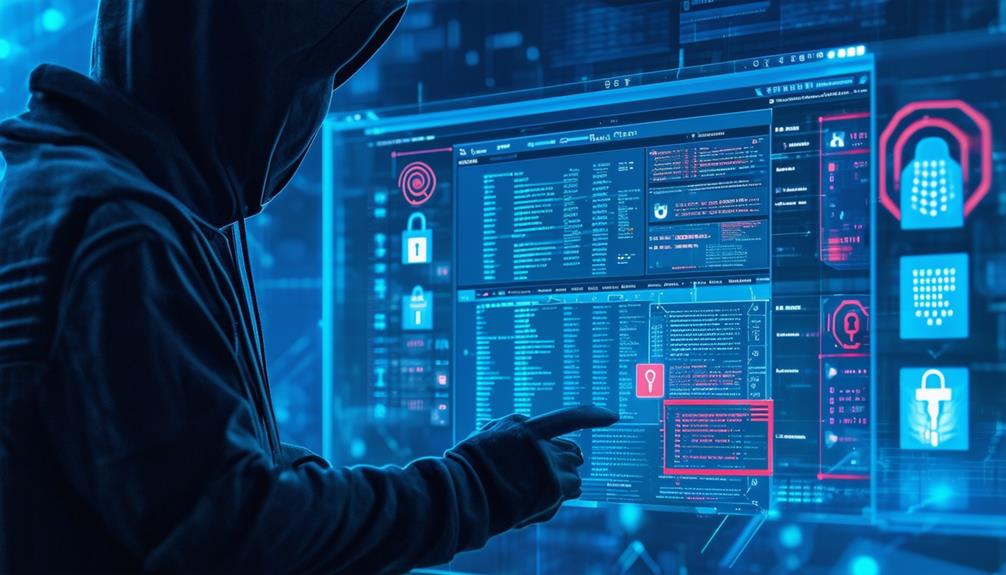In the domain of cybersecurity, AI leverages advanced data analysis to excel in threat detection, while ethical hacking employs penetration testing and vulnerability assessments to identify weaknesses. AI-powered cyber attacks automate techniques and manipulate behaviors, blurring the lines between human and AI threats. This collision impacts defense by enhancing real-time threat detection and improving incident response through proactive measures. Ethical hacking evolves with AI integration, transforming security practices and fortifying defenses. The future trends suggest a collaborative approach between AI and ethical hacking for adaptive defense strategies. The interplay between AI and ethical hacking shapes the cybersecurity landscape profoundly.
Key Takeaways
- AI enhances cyber defense with real-time threat detection.
- Ethical hacking uncovers vulnerabilities for proactive security measures.
- AI automates cyber attacks, blurring human and AI threat lines.
- Collaboration between AI and ethical hacking strengthens cybersecurity.
- Future trends merge AI with ethical hacking for adaptive defense strategies.
AI's Role in Cybersecurity
AI plays a pivotal role in cybersecurity by excelling in threat detection and prevention through its advanced data analysis capabilities. Machine learning and AI algorithms enable these AI tools to continuously improve their ability to identify and respond to cyber threats in real-time.
The evolving threat landscape requires a proactive approach to cybersecurity, and AI capabilities offer just that. By leveraging predictive analytics, AI in cybersecurity can forecast potential cyber threats, allowing organizations to implement preemptive defense strategies. Incident response is also greatly enhanced by AI, as it automates processes and enables swift reactions to cyber attacks.
Furthermore, AI excels in behavioral analysis, detecting anomalies and insider threats within networks. This level of detection and prevention is essential in safeguarding against both internal and external cyber threats. The adaptability of AI to recognize new attack vectors and patterns further strengthens its position in bolstering cybersecurity defenses in today's digital age.
Ethical Hacking Techniques

In the domain of cybersecurity, ethical hacking techniques play a pivotal role in fortifying defenses against potential cyber threats. Ethical hackers employ various strategies to guarantee systems are secure and resilient.
Some key techniques they utilize include:
- Penetration Testing: Ethical hackers simulate cyberattacks to identify vulnerabilities that malicious actors could exploit.
- Social Engineering: This technique involves manipulating individuals to divulge sensitive information, helping ethical hackers understand potential weak points.
- Vulnerability Assessments: Ethical hackers conduct thorough assessments to detect anomalies and proactively address security gaps.
- Alerting Security Teams: Ethical hackers play an essential role in alerting security teams to potential vulnerabilities, enabling quick mitigation actions.
- Utilizing AI Technologies: Ethical hackers leverage AI technologies, such as natural language processing, to enhance their testing capabilities and stay ahead of cyber threats.
AI-Powered Cyber Attacks

The emergence of AI-powered cyber attacks has revolutionized the landscape of cybersecurity defense strategies. These attacks leverage sophisticated machine learning algorithms to automate attack techniques, enabling a new level of efficiency and complexity.
By incorporating advanced social engineering tactics, AI can manipulate human behavior and exploit vulnerabilities in ways that were previously unseen. Additionally, AI-generated malware has the ability to constantly adapt and evolve, evading traditional security measures effectively.
One of the significant challenges posed by AI-driven attacks is that they blur the line between human hackers and automated threats, making detection increasingly difficult for cybersecurity professionals. In addition, these attacks have the potential to scale rapidly, targeting multiple systems simultaneously and intensifying the impact of cyber incidents.
As a result, organizations need to adapt their defense strategies to effectively combat the evolving landscape of AI-powered cyber threats.
Impact on Cyber Defense Strategies

With the rise of AI-powered cyber attacks shaping the cybersecurity landscape, organizations are increasingly leveraging innovative approaches to fortify their defense strategies. The integration of AI and ethical hacking has had a profound impact on cyber defense, revolutionizing the way organizations combat threats.
Here are some key ways this integration has influenced cyber defense strategies:
- AI enhances threat detection by analyzing massive datasets in real-time.
- Ethical hacking plays an important role in identifying vulnerabilities to strengthen defenses proactively.
- The synergy between AI and ethical hacking improves incident response capabilities for swift threat mitigation.
- Advanced AI algorithms adapt to emerging threats, enhancing the effectiveness of defense strategies.
- Collaborative efforts between AI technologies and ethical hacking practices enable proactive threat management, ensuring a more robust cybersecurity posture.
This combined approach is essential in the ever-evolving landscape of cybersecurity, where threats continue to grow in sophistication and frequency.
Innovations in Ethical Hacking

Recent advancements in ethical hacking have transformed traditional security testing methodologies, paving the way for more sophisticated and proactive approaches in identifying vulnerabilities.
Ethical hackers leverage AI technologies to enhance security measures through thorough assessments and threat hunting activities.
Red teaming exercises, which simulate real-world cyber attacks, help in testing the effectiveness of defense strategies implemented by organizations.
Automation tools powered by AI play a vital role in streamlining ethical hacking practices, enabling efficient security testing processes.
Future Trends in Cybersecurity

As the digital landscape continues to evolve rapidly, the future of cybersecurity is increasingly intertwined with advancements in artificial intelligence (AI). The following trends are expected to shape the cybersecurity landscape in the coming years:
- AI in cybersecurity is poised to enhance threat detection, incident response, and predictive analytics capabilities.
- Ethical hacking practices will evolve through the integration of AI for vulnerability assessments and red teaming exercises.
- Collaboration between AI and ethical hacking will fortify cybersecurity defenses by improving threat detection and enabling automated security checks.
- The challenges in cybersecurity, including adversarial AI attacks and ethical considerations, will play a significant role in shaping the future of AI and ethical hacking.
- The future of cybersecurity will heavily rely on the proactive utilization of AI for swift incident response, intelligent decision-making, and the implementation of adaptive defense strategies.
Frequently Asked Questions
Which Is Better, AI or Ethical Hacking?
In the domain of cybersecurity, the comparison between AI and ethical hacking is not about superiority but rather collaboration. AI automates threat detection, while ethical hacking proactively identifies vulnerabilities, both playing crucial roles in enhancing overall security defenses.
What Is the Difference Between Hacking and Ai?
Hacking involves exploiting vulnerabilities for unauthorized access, while AI simulates human intelligence. Hackers use skills for malicious purposes, AI aids in offensive and defensive cybersecurity. Hacking breaches security, AI enhances threat detection. Ethical hacking legally improves security, AI boosts defenses.
Can a Hacker Be Replaced by Ai?
While AI can automate hacking tasks, replacing a human hacker entirely is challenging due to the intricate problem-solving, creativity, and adaptability required in cybersecurity. Human hackers offer unique insights and responses essential in combating evolving threats.
How Is AI Used in Ethical Hacking?
In ethical hacking, AI plays a pivotal role by enhancing vulnerability assessments, automating security checks, and bolstering threat detection. Its integration streamlines operations and fortifies cybersecurity defenses, marking a significant advancement in the field.
Conclusion
In the ever-evolving landscape of cybersecurity, the battle between AI and ethical hacking continues to shape the future of digital defense. As these two forces clash, the intricate dance of innovation and strategy unfolds, pushing the boundaries of technology and ethics.
The ultimate showdown between AI and ethical hacking serves as proof of the ongoing struggle for security in a world where virtual threats loom large.









